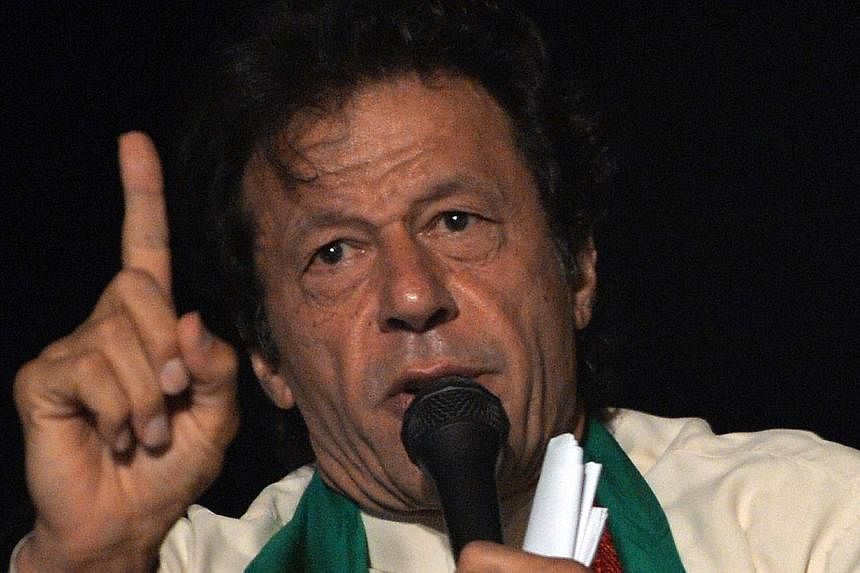ISLAMABAD (AFP) - Pakistan's Imran Khan on Sunday called on thousands of protesters rallying in Islamabad to launch a civil disobedience movement against the government, as a leading cleric said that only a "revolution" would bring about change.
"There is only one way to get rid of this government, which is to launch a civil disobedience campaign from today," the cricketer-turned politician said, addressing the protesters he had led to the capital from the eastern city of Lahore.
He appealed to the people to stop paying utility bills and taxes to the current government, accusing Prime Minister Nawaz Sharif of plundering national wealth to furnish his business empire.
"I am giving a two-day deadline to the government," he said, adding that after that he would not be able to stop his workers from marching on the prime minister's house in the "Red Zone", where government buildings and embassies are located.
Khan's announcement came as thousands of opposition demonstrators crowded the streets of the Pakistani capital for a second day Sunday, after a populist cleric issued a 48-hour ultimatum demanding the arrest of Sharif.
Addressing supporters on Sunday, Canadian-Pakistani cleric Tahir-ul-Qadri said that what he called a corrupt system of governance could not be changed without a revolution.
"The country's survival will be at stake if Nawaz Sharif and his cronies are allowed to rule the country," Qadri said.
"We don't want mid-term elections... what we want is revolution," he said, adding that corruption and plundering of the national wealth was rampant.
"We will not allow this system to continue any more".
Security in Islamabad has been ramped up since the protests began, with some 30,000 police and other security forces on the streets.
The government has agreed to let the two groups hold rallies but many roads have been blocked off with shipping containers to protect sensitive areas.
Khan on Saturday called on Sharif to step down, lashing out at a government which he claims won power fraudulently at last year's general election.
"We will not go back until all our demands are accepted," Khan said earlier, calling for all the officials involved in alleged vote-rigging to be tried for treason.
The May 2013 general election saw Sharif take power in a landslide, and international observers who monitored the polls said they were free and credible.
The protests are the culmination of a "long march" - in reality a motorised cavalcade - that set off Thursday from Lahore, around 300km away, to try to topple the government.
But the fiery speeches by Khan and Qadri were not matched by manpower. Just thousands of protesters remained in the capital as of Sunday evening as against a million people promised by the pair.
Qadri has called for Sharif's arrest over what he alleges was the murder of his supporters, and for the installation of an interim national government.
The cleric, who late Saturday issued a 48-hour ultimatum to the government to accept his demands, said he would not be responsible for any repercussions if they were not met.
He said Sharif and his younger brother Shahbaz Sharif, who is chief minister of the largest province of Punjab, had no right to sit in government, their cabinets should be dissolved and they should be arrested on murder charges.
Ten workers of Qadri's Pakistan Awami Tehreek movement were killed in clashes with police at his headquarters in Lahore on June 17. A judicial commission was formed to investigate.
Analysts warned there was no quick solution to the impasse.
"Apparently there are no signs that the government and the two parties are working towards a solution of the problem... both are sticking to their positions, leading to a deadlock," analyst Hasan Askari told AFP.
"If political leaders fail to resolve this problem and violence starts, then the initiative will shift to the military - either to mediate the problem or see to it that the stalemate is resolved," he said.
Senior politicians have intensified their efforts to avert a crisis, however.
Siraj-ul-Haq, chief of the religious Jamat-e-Islami party, met the opposition leader in parliament's lower house, Syed Khursheed Shah, to discuss the situation.
"The entire nation is upset over what is happening in Islamabad... we have to steer the country out of this crisis with a cool mind," Haq told reporters after meeting Shah in Karachi.
"We will not allow democracy to be derailed at any cost."

